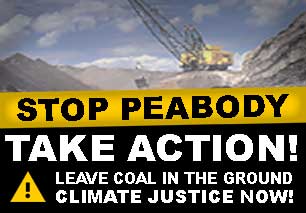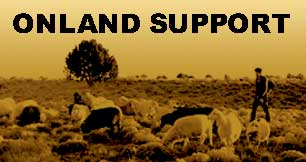Statement from BMIS Regarding the Upcoming Training Camp
This camp is indebted to Fern Benally and Don Yellowman for going to St. Louis last year to attend the RAMPS [West Virginia] and MORE [Missouri] Winter Action camp, for their continued building between coal impacted communities; and for their vision to gather to strengthen each others’ work in defending Mother Earth.
As to the origin of this camp, Fern said, “It all started in Cactus Valley. The HPL elders choose me to go confront Peabody Energy. At the St.Louis camp, I was so impressed by M.O.R.E, R.A.M.P.S, and BMIS I invited them to come out to Black Mesa for an Action and Training Camp. Over the last year it has been my understanding that Bahe, Danny, Marie, and Louise have been a driving force for this camp, organizing people from the HPL and larger Navajo Nation.”
BMIS appreciates the hard work and tremendous efforts of the all the camp coordinators* who have led this process of getting input from the elders, connecting with local organizers and communities, putting forward goals of connecting local environmental organizing, and centering the four directions planning model to make this a unique and exciting training camp. We also want to express gratitude to everyone else who has been supporting, giving energy, feedback, and critique to strengthen the goals, vision, and direction of the camp, and help in the process of clarifying roles and decision making. Finally, we are inspired by the steadfast resistance of the Black Mesa and Big Mountain communities and are grateful for their guidance.
*This camp is organized by several members of the Big Mountain and Black Mesa communities operating under the name Sovereign Dineh Nation (SDN), members of Save the Confluence, members of RAMPS (West Virginia), and members of MORE (Missouri), along with the BMIS collective.
Planning and Broadening Accountability
BMIS has always strived to build accountable, transparent and relationships grounded in on-land-based support with Black Mesa communities resisting forced relocation. Our priorities are responding to requests for on-land volunteers and putting out the statements and calls for support from communities who are maintaining their traditional lifeways on their ancestral homeland. One goal of the upcoming training camp is to shift the dynamic of BMIS as the primary outlet for communications coming from the resistance communities. Hopefully, connections made between Black Mesa resistance communities and other local organizers will expand the ways and places in which that the story of this resistance is represented to the world.
Roles in Camp Organizing
BMIS has focused on logistical support and fundraising while SDN’s and local organizers have facilitated the planning process for the camp itself. While at camp, the facilitation, decision making, media, and representation will be led by communities/ Native & local orgs involved. BMIS will be helping bottom line communication to the kitchen, keeping wood and water supplied, giving rides, checking in with local families about their sheep herders and making sure they can come for as much of the camp as possible, and other behind the scenes tasks that are asked of us.
Transparency and Outreach
Big Mountain and Black Mesa community members have outreached to the Big Mountain and surrounding communities and local organizers; two local Dineh organizers from Save the Confluence are connecting with organizers and communities across the Navajo Nation and throughout the region; people from other front line communities have been outreaching to trainers for the non-violent direct action trainings; BMIS has been following up with participants from last year’s gathering and with other trainers.
In the process of BMIS’s aspirations to build on alliances from last June’s gathering, we failed to outreach properly to people from O’odham lands who participated in that gathering. As a collective we have failed to uphold our vision of supporting all Indigenous communities’ in connecting with Big Mountain and Black Mesa relocation resisters. As an O’odham organizer pointed out, it’s important to build with your neighbors and we want to take responsibility for that missed opportunity and highlight their work here: Akimel O’odham Youth Collective (AOYC), Gila River Against Loop 202 group (GRAL202), O’odham Solidarity Across Borders Collective (OSABC), Shinning Soul, Akimel O’odham youth ska-core band Requiem, and Tohono O’odham Hemajkam Rights Network (TOHRN).
At this time, BMIS offers our sincerest apologies for these oversights in organizing, the impact it has had on others and this gathering, and we are committed to learning from our mistakes.
Decision-Making Process Concerning Direct Action
BMIS wants to state our role, not as decision makers, but a solidarity organization invested in as much broad based guidance and input as possible. We have not/will not support or advocate for an action unless it is agreed upon by community members who will be most impacted by such an action.
Moving Forward
BMIS will continue working to reflect and be accountable and transparent. We hope our process will not detract or distract from the amazing organizing, community direction, goals of honoring resistance and resiliency and all the workshops, discussions and trainings happening at the camp. BMIS will encourage participants to give input to how this solidarity collective can evolve/ transform to either be part of a multiracial solidarity/ joint struggle network or evolving the collective itself. We are committed to providing a space for that feedback and critique. We look forward to what can emerge from this camp.


